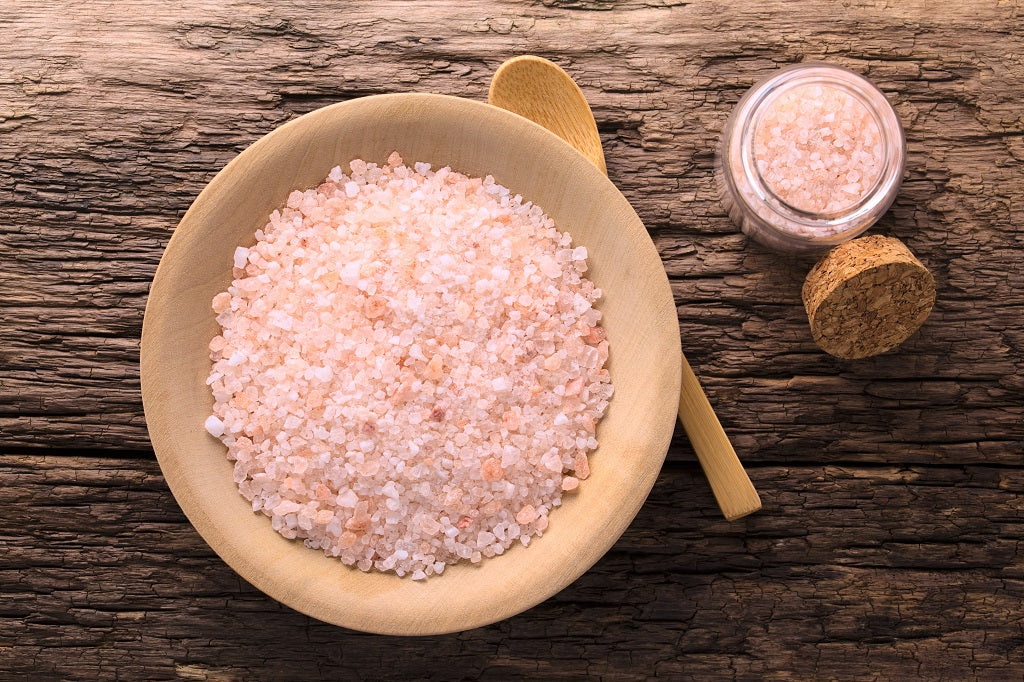Welcome to our article where we explore the surprising health benefits of edible and sante heritage salt for animals.
Salt plays a crucial role in maintaining a healthy body. While it is commonly associated with negative health effects, such as high blood pressure and hypertension, the right type of salt in appropriate quantities can offer a variety of health benefits.
In this article, we will delve into the differences between edible and sante heritage salt for animals, their unique health benefits, and how they can be incorporated into your diet to enhance overall health and well-being.
Key Takeaways:
- Sante Edible and Sante heritage salt for animals can provide essential minerals to support various bodily functions.
- Both types of salt should be consumed in appropriate quantities and as part of a balanced diet.
- Consult with a healthcare professional or nutritionist to determine the appropriate amount of salt for your individual needs.
- Sante Edible salt is primarily composed of sodium chloride and is commonly used in cooking and food preservation to enhance flavor.
- Sante heritage salt for animals is formulated specifically for the dietary needs of livestock and other animals, providing essential minerals for optimal health and performance.
What is Sante Edible Salt?

Before we dive into the health benefits of edible salt, let’s first understand what it is. Edible salt, also known as table salt, is a mineral compound made up primarily of sodium chloride. It is commonly used in cooking and food preservation to enhance flavor.
| Himalayan Pink Salt | Mined from ancient sea beds in the Himalayan mountains Contains trace minerals such as calcium, magnesium and potassium Distinctive pink color due to iron oxide |
Health Benefits of Edible Salt
Sante Edible salt is an essential source of sodium, which plays a crucial role in maintaining fluid balance, nerve function, and muscle contraction. It also helps regulate blood pressure and plays a key role in the absorption of nutrients. Additionally, certain types of edible salt contain trace minerals that contribute to overall health.
However, it’s important to note that consuming too much salt can have negative effects on your health. The American Heart Association recommends no more than 2,300 milligrams (mg) of sodium per day, with an ideal limit of no more than 1,500 mg per day for most adults.
Consult with a healthcare professional or nutritionist to determine the appropriate amount of salt for your individual needs.
Types of Sante Edible Salt
There are several types of edible salt available, each with unique properties and health benefits. Understanding the differences between these types can help you make informed choices for your dietary needs.
| Description | Mineral Content | |
| Sante Heritage Pink Salt | This type of salt is mined from ancient sea salt deposits in the Himalayan foothills. It gets its pink color from the presence of iron oxide. Himalayan pink salt is minimally processed and contains trace minerals such as calcium, potassium, and magnesium. | Sodium, chloride, and trace minerals |
Health Benefits of Edible Salt
Edible salt is a crucial source of sodium, which plays a vital role in maintaining fluid balance, nerve function, and muscle contraction. Sodium also helps regulate blood pressure and is necessary for the absorption of various nutrients, including glucose and amino acids.
Additionally, certain types of edible salt, such as Himalayan salt, contain trace minerals like magnesium, potassium, and calcium that have been linked to improved bone health, lower blood pressure, and reduced risk of chronic diseases like heart disease and stroke. These minerals also contribute to overall well-being and help reduce inflammation in the body.
However, it is important to note that consuming too much sodium can have adverse effects, such as increased blood pressure and a heightened risk of heart disease. The American Heart Association recommends limiting sodium intake to no more than 2,300 milligrams per day, or even lower for certain groups, such as those with high blood pressure or kidney disease.
What is the Benefits of SANTE HERITAGE SALT FOR ANIMAL?

In this section, we will explore the world of salt for animals. Salt for animals, also known as livestock salt or mineral salt, is a specific type of salt formulated for the dietary needs of livestock and other animals.
It provides essential minerals required for optimal health and performance. These minerals include:
| Mineral | Function |
| Sodium | Controls fluid balance and helps the body absorb nutrients. |
| Calcium | Crucial for bone development, muscle function, and blood clotting. |
| Phosphorus | Important for cellular function, bone development, and energy production. |
| Zinc | Essential for immune system function, wound healing, and cell growth and division. |
SALT FOR ANIMAL comes in various forms, such as blocks, granules, and loose mixes. These different forms allow animals to consume the salt in a way that suits their natural behavior and feeding patterns.
“SALT FOR ANIMAL is a vital component in ensuring livestock have the necessary minerals required for their wellbeing and performance.”
Importance of SALT FOR ANIMAL for Livestock

SALT FOR ANIMAL, also known as livestock salt or mineral salt, plays a crucial role in maintaining the health and optimal performance of livestock. As herbivorous animals, they often struggle to consume the necessary minerals needed for growth, reproduction, and overall well-being. Thus, SALT FOR ANIMAL acts as a supplement to fill this gap, ensuring that livestock has the essential minerals required for their body functions.
SANTE HERITAGE SALT FOR ANIMAL is formulated to meet the specific dietary needs of livestock, providing a balanced mix of minerals such as sodium, calcium, and phosphorus. These minerals play a critical role in bone development, muscle function, and reproductive health. Furthermore, sodium helps regulate fluid balance, aids in nutrient absorption and supports nerve function.
| Mineral | Role |
| Sodium | Regulates fluid balance, aids in nutrient absorption, and supports nerve function |
| Calcium | Facilitates bone growth and development, muscle function, and supports heart health |
| Phosphorus | Helps in the formation of bones and teeth, and supports kidney function |
Not only do these minerals benefit the livestock, but they can also have a positive impact on the products derived from them, such as milk and meat. Studies have shown that animals treated with mineral supplements produce higher-quality products with increased yields. Thus, SALT FOR ANIMAL can have a significant impact on the economics of livestock farming.
Overall, SANTE HERITAGE SALT FOR ANIMAL is a vital component of any livestock diet, contributing to healthy growth, development, and performance. Regular access to SALT FOR ANIMAL ensures that livestock receives the necessary minerals required for their body functions.

Health Benefits of Salt for Animal
SALT FOR ANIMAL is not just essential for livestock, but it can also provide health benefits for humans. Let’s explore some of the ways consuming SALT FOR ANIMAL can contribute to your overall well-being.
Supports Electrolyte Balance
SALT FOR ANIMAL contains minerals like sodium, potassium, and magnesium, which are critical for maintaining electrolyte balance in your body. Electrolytes are necessary for regulating the fluid balance and pH level in your cells, as well as supporting electrical impulses that allow your muscles and nerves to function correctly.
Promotes Muscle Strength
The minerals found in SALT FOR ANIMAL also play a role in supporting muscle strength. Potassium, in particular, is crucial for maintaining muscle mass and preventing muscle weakness and cramps.
Supports Nerve Function
SALT FOR ANIMAL contains essential minerals that support nerve function. Proper nerve function is essential for many bodily processes, including muscle movement, digestion, and respiration.
May Have Anti-inflammatory Properties
SALT FOR ANIMAL contains minerals like calcium and magnesium that have anti-inflammatory properties. Consuming SALT FOR ANIMAL may help reduce inflammation in the body, which can be beneficial for individuals with inflammatory conditions like arthritis.
May Improve Bone Density
The minerals found in SALT FOR ANIMAL, such as calcium and phosphorus, are essential for maintaining healthy bones. Adequate intake of these minerals can help improve bone density, reducing the risk of fractures and osteoporosis.
May Support Thyroid Function
SALT FOR ANIMAL contains iodine, a mineral that is crucial for proper thyroid function. The thyroid gland produces hormones that regulate many bodily functions, including metabolism, body temperature, and heart rate.
Overall, incorporating SALT FOR ANIMAL into your diet can provide numerous health benefits. However, it is essential to consume it in appropriate quantities, as excessive salt intake can lead to high blood pressure and other health issues. Consult with a healthcare professional or nutritionist to determine the appropriate amount of salt for your individual needs.
Conclusion
We hope this article has shed some light on the health benefits of edible and SALT FOR ANIMAL. Incorporating these salts into your diet can have a positive impact on your overall well-being. Edible salt provides essential sodium and trace minerals for various bodily functions, while SALT FOR ANIMAL offers important minerals for livestock and potential benefits for human consumers.
It is crucial to consult with a healthcare professional or nutritionist to determine the appropriate amount of salt for your individual needs. While these salts offer many health benefits, excessive intake can also have adverse effects on your health.
Start unlocking these valuable health benefits by integrating edible and SALT FOR ANIMAL into your diet today. And for your livestock animals, provide them with quality SALT FOR ANIMAL that is formulated to meet their specific dietary requirements.
FAQ
What are the health benefits of edible salt?
Edible salt provides crucial sodium and trace minerals that support fluid balance, nerve function, muscle contraction, blood pressure regulation, and nutrient absorption.
How does SALT FOR ANIMAL benefit livestock?
SALT FOR ANIMAL, formulated for the dietary needs of livestock, provides necessary minerals like sodium, calcium, and phosphorus, supporting hydration, nutrient absorption, growth, bone development, and reproductive functions.
Can SALT FOR ANIMAL offer health benefits to humans?
When consumed in appropriate quantities, SALT FOR ANIMAL can provide essential minerals that contribute to electrolyte balance, muscle strength, and nerve function in humans.
How can I incorporate edible and SALT FOR ANIMAL into my diet?
Consult with a healthcare professional or nutritionist to determine the appropriate amount of salt for your individual needs. You can start by using edible salt in cooking and seasoning, and consider using SALT FOR ANIMAL in moderation as a source of essential minerals.
